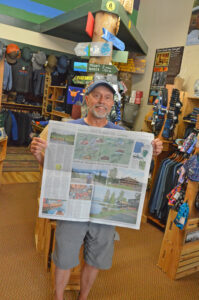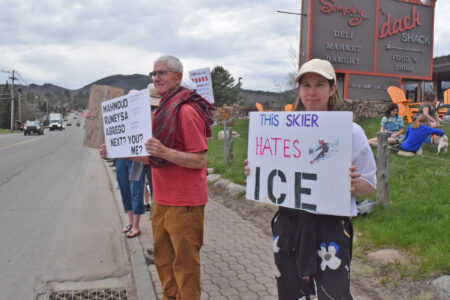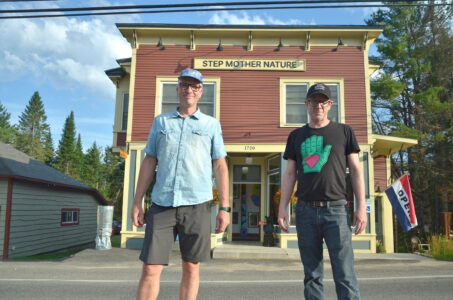Local writer turns personal suffering into a transformative experience

Lake Placid local and Saranac Lake High School English teacher Kelsey Francis is seen at Origin Coffee Co. in Saranac Lake Wednesday. Francis has had columns published in the Washington Post and the New York Times. (Enterprise photo — Griffin Kelly)
SARANAC LAKE — When Kelsey Francis gave birth to a baby girl nine years ago, she never knew her story would reach millions of readers. Her daughter June came into this world with ten little fingers and ten little toes, like many babies. Francis had been in labor for the better part of day, like many mothers. She and her husband held June in their arms after the delivery, like many parents.
However, June didn’t have a heartbeat. She was stillborn, and Francis knew this through out her entire delivery.
“Everything about it was like every other birth, and everything about it was nothing like every other birth,” she said. “I feel like some people forget that I had to give birth, and I had to recover from child birth. My milk came in. I had to deal with everything that every woman who has a baby has to deal with, but I had no baby. That is a torture unlike any.”
Francis, a Lake Placid local and Saranac Lake High School English teacher, recently had this story and a few others published in major news outlets such as the Washington Post and the New York Times. She’s also published pieces in the Enterprise and Lake Placid News.
Her writing’s significance has transformed over the years. First it started as a creative outlet, detailing interesting and humorous anecdotes she would show to her family at later dates — like literary photographs. Then the pieces became therapeutic and a way to grieve. Feelings of isolation after traumatic events brought her back to a notebook. And as of recently, her pieces have transformed into a means for communicating with the public and sharing stories so that people in similar situations can know they’re not alone.
“It’s been very humbling and overwhelming in the best of ways,” she said. “The feedback I’ve been getting has been ‘Thank you for telling this story.’ Some have never had a child but they say ‘you articulate it in such a way that gives me greater compassion for someone who has.’
“I feel very honored that people are reading my stories and connecting with them,” she continued. “If people are reading them and thinking about stillbirth, or parenting or anything that makes them connect, I’m incredibly grateful.”
One piece for the Washington Post is titled “How my son, and a pleather jacket, schooled me on being a 10-year-old boy today.” It tells about her son’s affinity toward a pleather jacket with gold zipper pockets and a hot pink lining. It was made with girls in mind, but her son didn’t care. Francis liked the jacket too, but feared her son might be teased for wearing it.
“I know you and Dad are old and don’t really get it, but kids can wear what they want now, okay?” he told his mother.
Back when Francis was a student in the 1980s in the suburbs of Washington D.C., there were strict codes to fashion and the way genders present themselves. Girls in her class were often teased for not sporting the popular clothing brands of the day, she said.
“He’s grown up in a different world. It’s much more open,” she said. “We as parents have raised him in that way, but I guess we didn’t even fully realize it.”
“I’d say what I saw in my son is what I see in my students,” she continued. “I think students are much more open-minded and accepting. Granted, there are always people who aren’t, but overall, students seem to be less phased by differences compared to when and where I grew up.”
In another piece for the Washington Post titled, “How we saved our marriage after my daughter was stillborn,” Francis details her and her husband spending a whole winter shoveling snow off of June’s grave.
At the time, Francis said she felt so alone. Her family and friends provided great support, but she didn’t know any other parents who’ve had a stillborn child. One time she and her husband drove all the way to Burlington, Vermont, in the middle of a blizzard for a support group. They were the only ones who showed up.
“That felt even more symbolic of our situation and the isolation,” she said.
Eventually, shoveling became one of the few emotional outlets available to them.
“That winter it was really snowy here, so it became a mission of mine to not let a flake touch her,” she said. “I was grateful that my husband bought into that because it truly became a sacred healing act. Once the ‘mother switch’ has been flipped on, you just don’t turn it off. I had no baby, but, dammit, I was going to take care of her however I could.”
The shoveling proved a very physical and cathartic bereavement process. The two could talk, cry or just heave snow in silence. It may seem unconventional, but Francis said it made her marriage stronger than ever.
Francis said her and her husband don’t need to shovel anymore, but they will if they visit June’s grave in the winter.
In an almost prequel piece for the New York Times’ Modern Love column titled “Wishing the world could be more soft,” Francis describes the initial process giving birth to June and explaining it to her son, a story she’d been writing and rewriting since the stillbirth.
In one part of the story, Francis and her husband are purchasing a plot for June at the cemetery. The scene reads like a couple going furniture shopping. The clerk even offered them a sale, so they could be buried in the plots right next to June.
“It was an out-of-body experience for me,” she said. “We didn’t know there was a sale, as if there was a sign. I try to imagine the woman tasked with this horrible job of selling plots to these clearly grieving parents. She must have been unbelievably uncomfortable, and just trying to say, ‘well, this is a nice space over here, and oh, by the way, you can get another one for a reduced rate.’ It wasn’t until many years later that I thought, ‘Oh my god, I’m so grateful for this purchase.'”
Since June, Francis has given birth to two more daughters. The kids know about their older sister. Even though Francis and her husband were the only ones to hold June, she’s very much still part of the family and part of her everyday life, Francis said.
“Over the years, I’ve had people tell me, ‘I don’t ask about June because I don’t want to upset you,'” Francis said. “And my response is, ‘You can never upset me by asking about my daughter.'”




